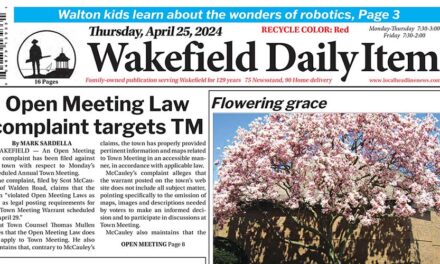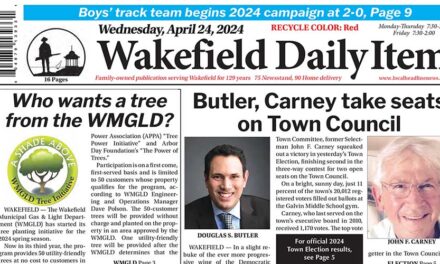Published in the December 9, 2016 edition.
By MARK SARDELLA
WAKEFIELD — Democratic legislative leaders, including Wakefield state Rep. Paul Brodeur, pushed back this week against Gov. Charlie Baker’s decision to chop nearly $100 million from the state budget, suggesting they might move next month to restore some of the spending.
None of the governor’s midyear “9C” cuts are expected to affect Wakefield’s general budget or local aid, according to Town Administrator Stephen P. Maio. But the governor’s budget ax did fall on $50,000 slated for improvements at the Public Safety Building and $25,000 that would have boosted the town’s Narcan program to reverse opioid overdoses.
Maio said, however, that $100,000 in funding for the Albion Street Cultural Exchange has, at least so far, survived the cuts. While he was grateful for that news, he did find the other cuts “a bit troubling.”
State Rep. Paul Brodeur also lamented the cuts.
“Governor Baker’s cuts to the State budget are premature,” Brodeur said. “Senator (Jason) Lewis, Representative (Donald) Wong and I worked very closely with Town Administrator Maio, the Board of Selectmen and other local officials to identify and fund local priorities, including improvements to the public safety building and increasing the supply of the overdose-reversing drug Nalaxone for our first responders. In instances like these, the community knows best how state funds can best help provide effective local services. It is particularly unfortunate to see almost $2 million in cuts to local substance abuse treatment programs across the state as these programs have impact beyond the local community and serve as incubators for developing innovative tools to combat the opioid crisis.”
House Speaker Robert DeLeo said on Twitter that lawmakers were considering filing a supplemental spending bill that would “help the neediest among us.” Senate President Stan Rosenberg said in response to DeLeo’s post that he looked forward to working with the speaker to restore funding to programs.
Baker, a Republican, announced plans Tuesday to unilaterally reduce executive branch spending by $98 million. He cited a shortfall in the state’s nearly $40 billion budget that was caused by lower-than-expected revenues and unforeseen spending obligations.
Baker also faulted the Legislature for overriding $231 million he vetoed from the budget after it was sent to his desk by lawmakers in July. The governor said while making the cuts was difficult, he was acting now to trim spending to avoid more serious fiscal problems or the need for tax increases down the road.
DeLeo, who also called the cuts “premature,” indicated that a decision on whether to seek restoration of some of the funding would likely be made in January, giving lawmakers a chance to first see how tax revenues perform in December.
State officials reported that November revenues missed benchmarks by more than $150 million, though $51 million in tax collections that would have been recorded last month were bumped into December because of a change in the state’s tax processing system.
Some of the agencies hit by the budget ax provide funding to reduce homelessness and fight opioid addiction, lawmakers contend.
George Bachrach, president of the Environmental League of Massachusetts, said Wednesday the governor’s spending reductions would “disproportionately devastate agencies protecting our environment and public health.”
The organization singled out cuts that it said amounted to 7 percent of the operating budget for the state agency that oversee state parks and forests, which has already seen its funding reduced by about 25 percent in recent years.
A nearly $1 million reduction in state funding for programs that combat HIV and AIDS would hurt efforts to educate the public about a promising new HIV prevention tool, said Carl Sciortino, executive director of the AIDS Action Committee.
For his part, Rep. Brodeur said that he would immediately start looking for other ways to fund critical local needs, especially in the area of fighting opioid addiction.
“In the coming days, I will be working diligently alongside my colleagues to identify other ways to direct resources to these important needs,” Brodeur said. “Ensuring the safety of our community and preventing overdose deaths remain my priorities as we look for new solutions.”
The Associated Press also contributed to this story.




